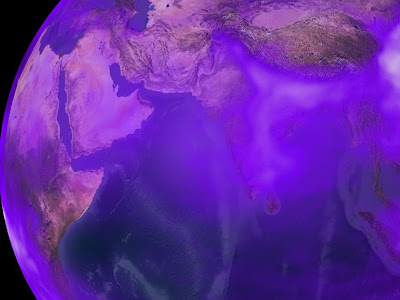 Black carbon soot, produced from incomplete combustion of diesel fuel and biomass, is one of the largest contributors to climate change apart from CO2 and should be a prime target of policymakers according to scientists and experts testifying at a hearing of the US House Select Committee on Energy Independence and Global Warming chaired by Congressman Edward Markey.
Black carbon soot, produced from incomplete combustion of diesel fuel and biomass, is one of the largest contributors to climate change apart from CO2 and should be a prime target of policymakers according to scientists and experts testifying at a hearing of the US House Select Committee on Energy Independence and Global Warming chaired by Congressman Edward Markey.“Black carbon packs a powerful punch when it comes to climate change, absorbing solar radiation while in the atmosphere and also darkening the surfaces of snow and ice, contributing to increased melting in vulnerable regions such as the Arctic and Himalayas,” said Durwood Zaelke, President of the Institute for Governance & Sustainable Development (IGSD).
“The good news is that it only stays in the atmosphere for up to a few weeks, making it an ideal target for achieving fast cooling through aggressive mitigation measures.” Reducing black carbon emissions and other short-term climate forcers such as HFCs, methane, and tropospheric ozone can serve as a complement to CO2 reduction measures, which can take up to 1,000 years to produce significant cooling because of CO2’s long atmospheric lifetime.
“A drastic reduction in BC has the potential of offsetting CO2-induced warming for a decade or two. Effectively, BC reduction may provide a possible mechanism for buying time to develop and implement effective steps for reducing CO2 emissions,” said Dr V. Ramanathan from Scripps Institution of Oceanography at the University of California, San Diego, in his written testimony. Because developed countries have been successful in reducing black carbon emissions in recent years, the technology exists to help developing countries, such as China and India, significantly cut their soot emissions, through diesel-particulate filters for vehicles and cleaner-burning cookstoves.
Dr Ramanathan has spearheaded the Project Surya programme to bring solar cookstoves to India to assist in gathering additional data on the climate forcing potential of black carbon and its impact on local health – emissions of black carbon contribute to respiratory illness, the fourth leading cause of excess mortality in developing countries.
“Policymakers are beginning to take note of black carbon and other short-term climate forcers like HFCs, methane, and tropospheric ozone, where emissions reductions are cost-effective and can yield major climate and health benefits,” added Zaelke. “These 'fast-action' strategies are low-hanging fruits that need to be picked now to avoid the dangerous near-term consequences of abrupt climate change.”

